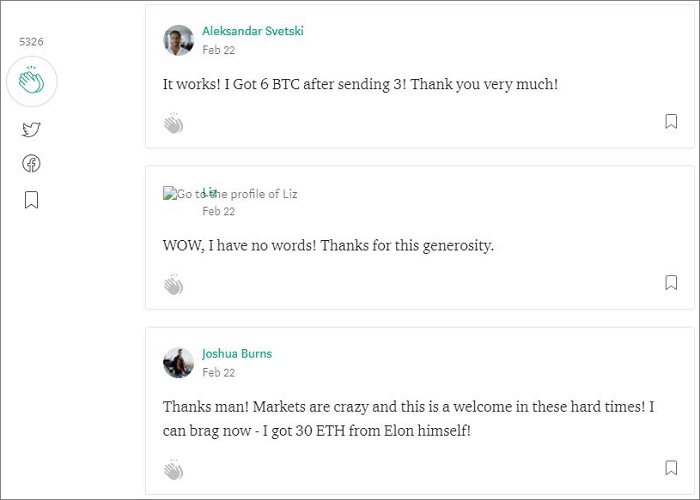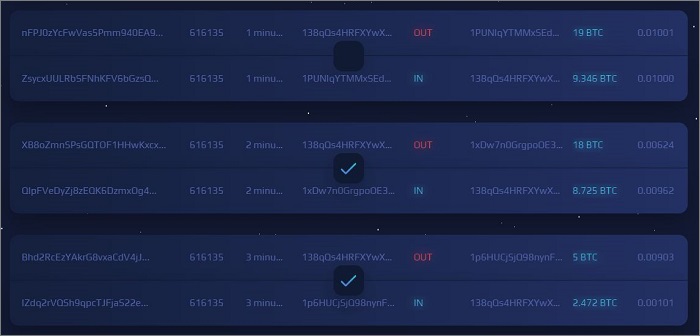A German man was scammed out of 10 bitcoin – valued today at $750,000 – after falling for a Twitter scammer who posed as Elon Musk.
Speaking to the BBC, Sebastian, who understandably didn’t want to use his real name, said the incident started when he saw Musk tweet the string of apparent nonsense, ‘Dojo 4 Doge’.
In the replies of Musk’s original tweet was a lookalike Elon Musk account which tweeted a link to a page offering the deal of the century.
“Our marketing department here at Tesla HQ came up with an idea: to hold a special giveaway event for all crypto fans out there,” the scam site said.
Send your bitcoin to our wallet, the fake Tesla promo site promised, and we will send back twice as much. And if that wasn’t good enough, Tesla would throw in a brand-new Tesla Model S to anyone who sends in four bitcoin or 150 Ethereum.
The German man, who has a marketing job in the IT industry, fell hook, line, and sinker.
“'Take the maximum', I thought, this is definitely real, so I sent 10 Bitcoin,” he told the BBC.
Dojo 4 Doge
— Elon Musk (@elonmusk) February 21, 2021
The scam took place less than two weeks after news surfaced that Tesla had spent nearly $2 billion on bitcoin.
Sebastian waited and waited, hoping to see the large amount of cryptocurrency land in his wallet. Then reality set in.
“I threw my head on to the sofa cushions and my heart was beating so hard,” he said.
“I thought I'd just thrown away the gamechanger for my family, my early retirement fund and all the upcoming holidays with my kids.
“I went upstairs and sat on the edge of the bed to tell my wife. I woke her up and told her that I'd made a big mistake, a really big mistake.”
After hours of trying to contact the scammer and get his bitcoin back, he realised the cryptocurrency was lost for good.
Convincing lookalike
The scammers tricked Sebastian out of his bitcoin with a set of clever tricks to imitate the famous entrepreneur.
Screenshots of the original scam reply tweet show it coming from an account called ‘E l o n M u s k’ (notice the spaces) with the same profile picture Musk had at the time. Crucially, it carried a blue check, the sign of a verified Twitter account.
The fake Musk account that fooled Sebastian in February belonged to YouTuber Josh McBride who, when told about the BBC article naming him as the source of the scam, said it was “actually insane”.
“I was in LA and my account was hacked,” McBride said. “Took me two days to get it back.”
Indeed, McBride had tweeted shortly after the scam tweet saying he got his account back and wishing harm on the hackers.
I got my account back!!! It’s really me!!! Fu*k you whoever hacked me! I hope you stub your toe today!
— Josh McBride (@JoshyMcB) February 22, 2021
The website McBride’s account linked to was also convincing. Built to look like it was from the blogging platform Medium, it looked like a legitimate post from Elon Musk, complete with thousands of ‘claps’ and comments praising Musk and his cryptocurrency giveaway.
Don't be fooled – these are fake comments.
That landing page linked people to the actual ‘promotion’ site featuring a wallet address and QR code along with prints tables of what appear to be examples of people sending large amounts of bitcoin to the address and receiving twice as much in return.
In reality, it’s just the site code transitioning tables of fake data down the page to feign activity.
This is just a trick to make it look like people are making money.
Not again, Elon
Sebastian isn’t the first person to be scammed by people taking advantage of Musk’s prominence and often bizarre Twitter activity.
In early 2018, fake Musk accounts were pulling the exact same scam and netting thousands of dollars’ worth of cryptocurrency in return.
Mid-last year, Musk and other celebrities had their twitter accounts hijacked to perpetrate another bitcoin giveaway scam.
The scammers moved 12.9 bitcoin into their own wallets but were eventually caught with the young man who gained access to Twitter’s backend tools being sentenced to three years in juvenile detention this week.
Musk has done little to discourage scammers, regularly posting about cryptocurrencies like the meme currency Dogecoin, helping to push up its value in the process.
This week, Musk appeared to jump on board the non-fungible token (NFT) bandwagon which his partner Grimes has used to sell millions of dollars’ worth of her digital art.
Actually, doesn’t feel quite right selling this. Will pass.
— Elon Musk (@elonmusk) March 16, 2021
The billionaire tweeted an animated video and accompanying song, saying he was “selling this song about NFTs as an NFT”.
A day later Musk said he “doesn’t feel quite right selling this”.












